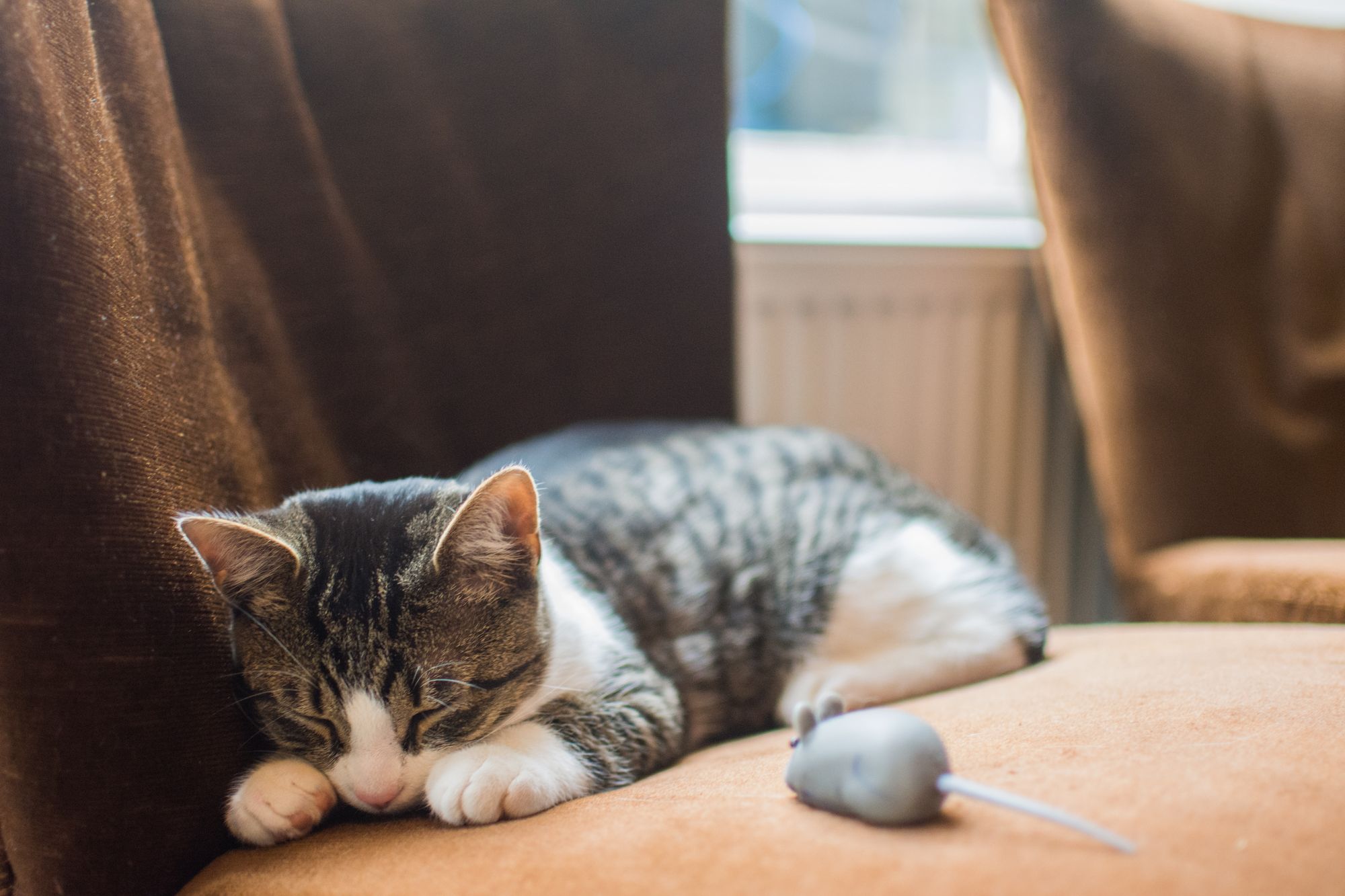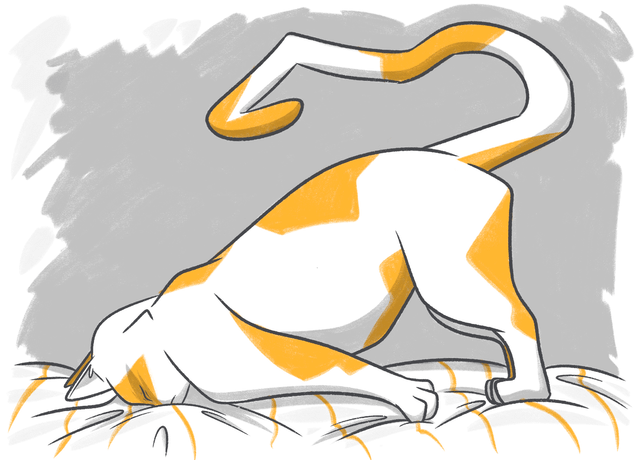Welcome, feline enthusiasts! Today, we’re going to delve into a common concern that plagues our purring companions: lethargy in cats. As pet owners, we cherish the playful and energetic side of our fur babies, and it’s worrying when they exhibit sluggish behavior. Don’t fear, however; we’re going to unravel the potential causes behind their lethargy, reveal when it's time to worry and share the steps you can take to support your sleepy kitties back to their spirited selves.
Stop Googling - Ask a Real Vet
Content:
- What is Lethargy in Cats
- What Are the Signs of a Lethargic Cat
- What Causes Lethargy in Cats
- How Do Vets Treat Lethargic Cats
- How Can the Emergency Fund Help with Treatment
- FAQs
- Conclusion
What is Lethargy in Cats
When your cat slides into a state of no energy, sluggishness, and/or extreme tiredness, they are experiencing lethargy. It is a general lack of motivation and energy that can be mild or severe.
Affecting both humans and animals, including cats and dogs, it is a symptom of an underlying medical condition or issue. Lethargy is not a medical issue; it is a symptom that arises because of a medical issue, such as illness or injury.
What Are the Signs of a Lethargic Cat
When a cat is lethargic, they may appear unusually inactive or slow, disinterested in their surroundings, and reluctant to engage in normal activities. It can take a while for pet parents to notice this particular symptom, as cats tend to sleep for up to 16 hours per day. This is why it’s helpful to invest in pet tech, such as Pet Camera.
You will know your cat’s routine better than anyone. I’m a cat owner, and my cat always comes to bed with me. I’ll give her a handful of treats, and then she waits for me to go to sleep before running riot around the house.
When something differs from your regular pet routine, such as sleeping more or having no interest in toys or treats, it is right for you to be a little concerned. If my cat were to sleep downstairs rather than come to bed with me, it would be a surefire sign that something wasn’t quite right.
What Causes Lethargy in Cats
Lethargy is a vague and non-specific symptom that will not point to a medical condition by itself. What other signs have your pet displayed? Make a note of everything you remember because other symptoms along with diagnostic testing, such as blood and urine tests, will determine the cause. The cause will then reveal the appropriate course or type of treatment.
The following medical conditions all come with lethargy as a symptom:
- Neurological issues;
- Gastrointestinal issues or disorders;
- Diabetes;
- Low blood cell count (anemia);
- Poor or malnutrition;
- Blockages of the intestinal tract (according to Cornell University College of Veterinary Medicine research, particularly from hairballs);
- Abnormal autoimmune disease;
- Inflammatory disorders;
- Respiratory issues and disorders;
- Urinary tract infections (lower);
- Cancer;
- Heart disease;
- Liver disease;
- Kidney disease;
- Animal bites and/or stings;
- Fleas and other parasites;
- Low blood sugar level (hypoglycemia);
- Trauma or pain;
- Bacterial, viral, or fungal infections.
As you can see, the list is long, and it is by no means comprehensive. Your pet can also experience lethargy as a result of medication side effects, including following vaccinations. These side effects will usually be communicated to you before the drugs are administered.
How Do Vets Treat Lethargic Cats
Before cats receive treatment for lethargy at the vet, the root cause must be determined; otherwise, the risk of harm to your pet is even greater. Your vet will ask questions, including about recent food and water intake, other signs and symptoms, and recent activities.
Fleas and some parasites are obvious to the naked eye, but that’s not the case with something like a low blood sugar level or cancer. For this reason, several diagnostic tests are performed, such as urine and stool analysis, physical examinations, and general monitoring. In some cases, vets may recommend X-rays or ultrasound to visualize the cat's internal organs and identify any structural abnormalities.
Depending on the vet's findings and suspicions, they may order additional tests, such as thyroid function analysis, virus screenings, or specific disease-related tests.
If they can't find a clear medical cause, they will likely suggest observing the cat closely to see if the issue resolves on its own or progresses into any other noticeable symptoms.
How Can the Emergency Fund Help with Treatment

Cats, like all pets, can face sudden health issues or accidents. Veterinary care is often expensive, especially in emergencies. Petcube’s Emergency Fund ensures you can afford the necessary medical treatment without cutting costs.
For less than $1 per day, you’ll have access to up to $3,000 worth of vet care for life-threatening pet emergencies. Your membership will also open the door to veterinary advice for questions and concerns at all hours of the day.
Life can be unpredictable, but at least you’ll be covered in the emergency pet care department!
FAQs
When should I take a cat with lethargy to the vet?
Mild lethargy can pass on its own, but if it turns into a serious case or continues for longer than 24 hours, it is highly recommended to seek veterinary advice. If in doubt, have a chat with one of Petcube’s 24/7 vets for further recommendations.
Why is my young cat suddenly weak and lethargic?
Lethargy in kittens can be a cause for concern, as their young age and vulnerability make them more susceptible to various health issues. They can quickly become dehydrated, which can lead to symptoms such as lethargy.
Some kittens are born with congenital health issues that cause lethargy, such as heart defects or respiratory problems. Transitioning from mother's milk to solid food can be challenging for some kittens, too. If you notice a kitten being lethargic, it is essential to seek prompt veterinary attention.
Conclusion
Lethargy can be a symptom of various underlying health issues, ranging from minor illnesses to more severe conditions, making it essential for pet owners to pay attention to their cat's behavior and well-being.
If your cat seems lethargic or displays other unusual symptoms or behaviors, always seek advice from a licensed vet. With links to serious, potentially deadly diseases and conditions, it’s not the kind of symptom you can ignore, especially if it persists.
Was this article helpful?
Help us make our articles even better









